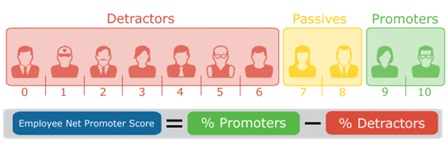What is eNPS?
Employee Net Promoter Score
The word refers to "Employee Net Promoter Score"!
Almost no organization can achieve high customer loyalty without having a loyal engaged workforce.
Engaged employees are enthusiastic about the company they work for and are spreading this enthusiasm to others. These ‘others’ can be both other employees or customers. Employee promoters power strong business performance because they offer a better customer experience and often approach their jobs with more energy, enhancing productivity as well. Managers and leaders, therefore, have all reason to enhance the loyalty and engagement of their employees.
As a result, practitioners of NPS have come up with a way to analyse employee engagement, based on the Net Promoter calculation, the eNPS.
Employees are asked one question: How likely is it that you recommend your employer to others on a scale of 0 to 10? The answers are divided into 3 groups: detractors (scores between 0 and 6), passive (scores 7 and 8) and promoters (scores 9 and 10).
The eNPS score is calculated by deducting the percentage of detractor from the percentage of promoters. Your final score (eNPS) can vary from -100 to +100, which of course applies: the higher, the better.

The eNPS system in Starred makes the people side of the business more transparent. Organisations can discover which departments represent liabilities and which offer potential best practices. You can also discover how team leaders are performing and what the improvement points or strengths per team specifically are. Ultimately, companies can also understand which elements of employee engagement influence the eNPS most by using Starred’s Priority Matrix.
🌟 Please note! eNPS can be substantially lower than customer scores. Employees often hold their company to even higher standards than do customers. :)
Updated 6 months ago
